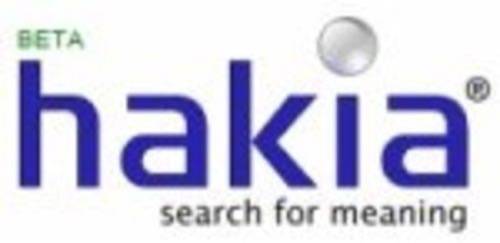This
week I spoke to Hakia founder and CEO Dr. Riza C. Berkan and COO Melek
Pulatkonak. Hakia is one of the more promising Alt Search Engines
around, with a focus on natural
language processing methods to try and deliver ‘meaningful’ search results.
Alex Iskold profiled
Hakia for R/WW at the beginning of December and he concluded, after a number
of search experiments, that Hakia was intriguing – but it was not a level to compete
with Google yet. It is important to note that Hakia is a relatively early
beta product and is still in development. But given the speed of Internet time,
3.5 months is probably a good time to check back and see how Hakia is
progressing…

What is Hakia?
Riza and Melek
firstly told me what makes Hakia different from Google. Hakia attempts to
analyze the concept of a search query, in particular by doing sentence
analysis. Most other major search engines, including Google, analyze keywords.
Riza and Melek told me that the future of search engines will go beyond keyword
analysis – search engines will talk back to you and in effect become your search
assistant.
One point worth noting here is that, currently, Hakia still has some human
post-editing going on – so it isn’t 100% computer powered at this point.
Hakia has two main technologies:
1) QDEX Infrastructure (which stands for Query Detection and
Extraction) – this does the heavy lifting of analyzing search queries at a
sentence level.
2) SemanticRank Algorithm – this is essentially the science they use, made up
of ontological semantics that relate concepts to each other.
If you’re interested in the tech aspects, also check out hakia-Lab
– which features their latest technology R&D.

How is Hakia different from Ask.com?
Hakia most reminds me of Ask.com, which uses more a natural language approach
than the other big search engines (‘ask’ a question, get an answer) – and also
Ask.com uses human editing too, as with Hakia. [I interviewed
Ask.com back in November]. So I asked Riza and Melek what is
the difference between Hakia and Ask.com?
Riza told me that Ask.com is an indexing search engine and it has no semantic
analysis. Going one step below, he says to look at the basis of their results.
Ask.com bolds keywords (i.e. it works at a keywords level), whereas Riza said
that Hakia understands the sentence. He also said that Ask.com categories are
not meaning-based – they are “canned or prefixed”. Hakia, he said,
understands the semantic relationships.
Hakia vs Google
I next referred Riza and Melek to Read/WriteWeb’s
interview with Matt Cutts of Google, in which Matt told me that Google is
essentially already using semantic technologies, because the sheer amount of
data that Google has “really does help us understand the meanings of words
and synonyms”. Riza’s view on that is that Google works with popularity
algorithms and so it can “never have enough statistical material to handle
the Long Tail”. He says a search engine has to understand the language, in
order to properly serve the Long Tail.
Moreover, Hakia’s view is that the vastness of data that Google has doesn’t
solve the semantic problem – Riza and Melek think there needs to be that semantic
connection present.
Their bigger claim though is that the big search companies are still thinking
within an indexing framework (personalization etc). Hakia thinks that
indexing has plateaued and that semantic technologies will take over for the next
generation of search. They say that semantic technologies allow you to analyze
content, which they think is ‘outside the box’ of what the big search companies
are doing. Riza admitted that it was possible Google was investigating semantic
technologies, behind closed doors. Nevertheless, he was adamant that the future
is understanding info, not merely finding it – which he said is a very
difficult problem to solve, but it’s Hakia’s mission.
Semantic web and Tim Berners-Lee

Throughout the interview, I noticed the word “semantic” was
being used a lot – but their interpretation seemed to be different to that of Tim
Berners-Lee, whose notion of a Semantic Web is generally what Web people think
about when uttering the ‘S’ word. Riza confirmed that their concept of semantic
technology is indeed different. He said that Tim Berners-Lee is banking on
certain standards being accepted by web authors and writers – which Riza said is
“such a big assumption to start this technology”. He said that it
forces people to be linguists, which is not a common skill.
Furthermore, Riza told me that Berners-Lee’s Semantic Web is about
“imposing a structure that assumes people will obey [and] follow”. He
said that the “entire Semantic Web concept relies on utilizing semantic
tagging, or labeling, which requires people to know it.” Hakia, he said,
doesn’t depend on such structures. Hakia is all about analyzing the normal
language of people – so a web author “doesn’t need to mess with
that”.
Competitors
Apart from Google and the other big ‘indexing’ search engines, Hakia is
competing against other semantic search engines like Powerset and
hybrids like Wikia. Perhaps also Freebase – although Riza thinks the latter may be “old semantic
web” (but he says there’s not enough information about it to say for sure).
Conclusion
Hakia plans to launch its version 1.0 (i.e. get out of beta) by the end of
2007. As of now my assessment is the same as Alex’s was in December – it’s a
very promising, but as yet largely unproven, technology.
I also suspect that Google is much more advanced in search technology than
Mountain View is letting on. We
know that Google’s scale is a huge advantage, but their experiments with things
like personalization and structured data (Google Base) show me that Google is
also well aware of the need to implement next-generation search technologies.
Also, as Riza noted during the interview, who knows what Google is doing behind
closed doors.
Will semantic technologies and ‘sentence analysis’ be the next wave of
search? It seems very plausible. So with a bit more development, Hakia could
well become compelling to a mass market. Therefore how and when Google responds
to Hakia will be something to watch carefully.









